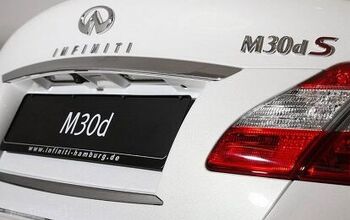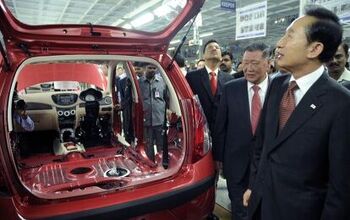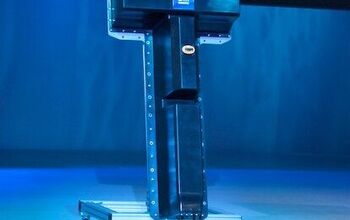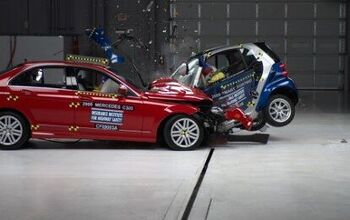Ask The Best And Brightest: Is Nissan About To "Pull A Hyundai"?
On the way to TTAC’s Southern Tour, I filled some of the gaps in my automotive history by reading Car Wars by Robert Sobel. Written in the same year that Nissan opened its first US plant, a sprawling complex in Smyrna, Car Wars documents the early years of the Detroit-Import wars, starting with the Beetle and ending with the rise of the transplant factories. The book is full of lessons, but its most rattling reminders was that Nissan was the major Japanese automaker during the early days of the Japanese industry. Nearly thirty years after Car Wars was written, Nissan often gets lost in Honda and Toyota’s shadow when it comes to perceptions of the Japanese OEMs. And lately Nissan has fallen off more than a few radar screens for the simple fact that its key products are aging: Sentra, Maxima and Altima were introduced for the 2007 model-year, while Rogue is just a year younger. Together these four models account for over half of Nissan’s monthly volume… and yet despite this aged core lineup, Nissan’s sales (as a brand) are up over 17 percent year-to-date, maintaining the brand’s consistent growth.
And, after touring the Smyrna facility last week, Nissan’s VP for Communications David Reuter told us that this fact was what made him so optimistic about Nissan’s future. If sales are doing this well with product this old, he wondered aloud, what might happen if.. say, models representing 75% of Nissan’s sales volume were replaced in a two-year span? He admitted that one of the brand’s biggest issues was breaking through the Honda-Toyota monopoly on media perceptions of Japanese automakers, and he suggested that a new product blitz was the only way to really accomplish that. I was reminded of the current darling of the mass-market brands, Hyundai, which grew sales steadily with aging and stolid but value-laden products, before replacing its entire lineup with eye-catching new models. Could a fresh batch of new designs do the same for Nissan?
Of course, a lot of that depends on product execution. Hyundai would not have garnered the attention it has if it had replaced its entire lineup with new but dowdy or uninspired models. And on that front the picture is still mixed: critics have been cruel to Nissan’s newest car, the Versa, but consumers have been snapping them up in the first two months of sales. Meanwhile, the brand’s recent niche products (Juke, Murano CC) have received mixed and polarized responses. And Nissan’s got a raft of new technology to play with for its new cars, including a next-gen CVT and its first-ever in-house front-drive hybrid system (look for Bertel to bring you more on that from Japan shortly). And though the brand likely won’t be jumping on the turbocharging bandwagon wholesale, it seems likely that our prayers have been answered and that the Juke’s delightful 1.6 turbo engine will make its way into an SE-R-type vehicle to celebrate the revamped lineup. This couldn’t hurt Nissan’s flagging reputation for sporting mass-market vehicles.
One thing is certain: Nissan may not get a lot of press these days, but the brand has been thriving given where it is in its key product cycles. If the new high-volume models (which Reuter says we’ll learn more about at the Detroit Auto Show) bring some pizzaz back to the brand, it could well be poised to exploit Honda’s recent product weaknesses and Toyota’s battered image. With the right execution, we could find ourselves returning to a time when Toyota and Nissan are once again the Japanese standard-bearers. On the other hand, Detroit isn’t sleeping on the competition the way it once was. And Hyundai will certainly have a few things to say about any company looking to steal its momentum.
So while we wait to learn more about Nissan’s upcoming product blitz, we’re curious to hear your take on the brand’s fortunes. What explains Nissan’s resilience in the face of old product? Do you expect the new products to vault the brand into the “hot” category, or do the downsides of recent products like Versa and Murano CC leave you a bit suspicious? Will Nissan surpass Honda as a leading Japanese brand, or is the Honda-Toyota duopoly cemented in the minds of consumers? What do you hope to see from the next-generation of Nissans? So many questions…
[Disclosure: Nissan bought me lunch when I toured their facilities in Smyrna and Franklin, and I am about to be bought dinner by the company in Seattle, where I will be hearing more about this subject from Director of Product Planning Mark Perry. If you have any questions for Mark, you have a few hours to post them in the comments below]
More by Edward Niedermeyer
Latest Car Reviews
Read moreLatest Product Reviews
Read moreRecent Comments
- Jalop1991 In a manner similar to PHEV being the correct answer, I declare RPVs to be the correct answer here.We're doing it with certain aircraft; why not with cars on the ground, using hardware and tools like Telsa's "FSD" or GM's "SuperCruise" as the base?Take the local Uber driver out of the car, and put him in a professional centralized environment from where he drives me around. The system and the individual car can have awareness as well as gates, but he's responsible for the driving.Put the tech into my car, and let me buy it as needed. I need someone else to drive me home; hit the button and voila, I've hired a driver for the moment. I don't want to drive 11 hours to my vacation spot; hire the remote pilot for that. When I get there, I have my car and he's still at his normal location, piloting cars for other people.The system would allow for driver rest period, like what's required for truckers, so I might end up with multiple people driving me to the coast. I don't care. And they don't have to be physically with me, therefore they can be way cheaper.Charge taxi-type per-mile rates. For long drives, offer per-trip rates. Offer subscriptions, including miles/hours. Whatever.(And for grins, dress the remote pilots all as Johnnie.)Start this out with big rigs. Take the trucker away from the long haul driving, and let him be there for emergencies and the short haul parts of the trip.And in a manner similar to PHEVs being discredited, I fully expect to be razzed for this brilliant idea (not unlike how Alan Kay wasn't recognized until many many years later for his Dynabook vision).
- B-BodyBuick84 Not afraid of AV's as I highly doubt they will ever be %100 viable for our roads. Stop-and-go downtown city or rush hour highway traffic? I can see that, but otherwise there's simply too many variables. Bad weather conditions, faded road lines or markings, reflective surfaces with glare, etc. There's also the issue of cultural norms. About a decade ago there was actually an online test called 'The Morality Machine' one could do online where you were in control of an AV and choose what action to take when a crash was inevitable. I think something like 2.5 million people across the world participated? For example, do you hit and most likely kill the elderly couple strolling across the crosswalk or crash the vehicle into a cement barrier and almost certainly cause the death of the vehicle occupants? What if it's a parent and child? In N. America 98% of people choose to hit the elderly couple and save themselves while in Asia, the exact opposite happened where 98% choose to hit the parent and child. Why? Cultural differences. Asia puts a lot of emphasis on respecting their elderly while N. America has a culture of 'save/ protect the children'. Are these AV's going to respect that culture? Is a VW Jetta or Buick Envision AV going to have different programming depending on whether it's sold in Canada or Taiwan? how's that going to effect legislation and legal battles when a crash inevitibly does happen? These are the true barriers to mass AV adoption, and in the 10 years since that test came out, there has been zero answers or progress on this matter. So no, I'm not afraid of AV's simply because with the exception of a few specific situations, most avenues are going to prove to be a dead-end for automakers.
- Mike Bradley Autonomous cars were developed in Silicon Valley. For new products there, the standard business plan is to put a barely-functioning product on the market right away and wait for the early-adopter customers to find the flaws. That's exactly what's happened. Detroit's plan is pretty much the opposite, but Detroit isn't developing this product. That's why dealers, for instance, haven't been trained in the cars.
- Dartman https://apnews.com/article/artificial-intelligence-fighter-jets-air-force-6a1100c96a73ca9b7f41cbd6a2753fdaAutonomous/Ai is here now. The question is implementation and acceptance.
- FreedMike If Dodge were smart - and I don't think they are - they'd spend their money refreshing and reworking the Durango (which I think is entering model year 3,221), versus going down the same "stuff 'em full of motor and give 'em cool new paint options" path. That's the approach they used with the Charger and Challenger, and both those models are dead. The Durango is still a strong product in a strong market; why not keep it fresher?

































Comments
Join the conversation
I know the Xterra was available in S Americas with a diesel. Are there any plans to make it available in the US?
Key to this discussion should be that Nissan is a brand that spends a very limited amount of money on research and focuses largely on third world markets. In the long run, their relative strength in the US therefore depends on technological developments and consumer taste for cutting edge technology. I have heard claims that technological innovation in the US car market will be less important now than in the 10-20 years past, which suggests Nissan may fare well.